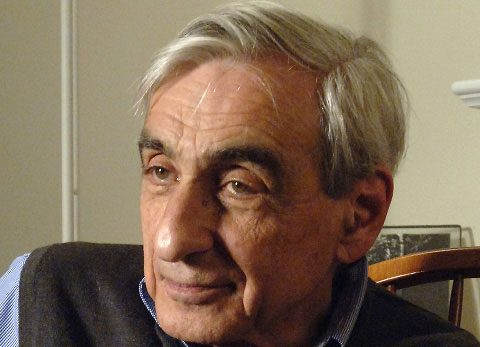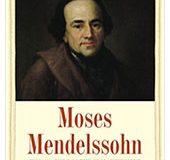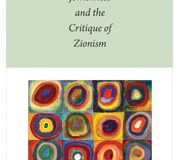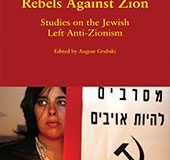Political thinker Michael Walzer and Fathom editor Alan Johnson discuss The Jewish Political Tradition, the ambitious multi-volume series Walzer is co-editing at Yale University Press.
Excavating the Jewish political tradition
Alan Johnson: Let’s start with two big questions. What is the Jewish political tradition? And what is the four volume work The Jewish Political Tradition that you are helping to edit?
Michael Walzer: Well, what we mean by the Jewish political tradition is simply the long history of Jewish reflection on the political experience of the Jews. It’s a political reflection on the experience of ancient Israel, and then of exilic Jewry. It’s not political writings by Jews but political writings about the Jewish political experience. There is a tradition of writers, mostly legal scholars, who reflect on the history and refer to each other and argue with each other and revise or repudiate each other’s positions and that’s the tradition that we have tried to record in the four volumes; two of which are published, and two still to come.
The volumes are anthologies of texts from the Bible and Talmud to Zionist pamphlets and Israeli Supreme Court decisions, which are accompanied by commentaries by contemporary political theorists, moral philosophers and lawyers. It’s an effort to present the tradition in the style of the tradition, since commentary is so central to it.
AJ: Writing in The New Republic David Novak called it ‘one of the most ambitious Jewish intellectual efforts of recent years.’ Why have you devoted so much of yourself to this project? You said it was to escape the umpteenth reading of John Locke’s Second Treatise! Was that remark flippant or serious?
MW: Well, first of all I should say I’m speaking for myself; my co-editors may have had other reasons for getting into this project, which has been more than a twenty year effort by now. Yes, I was bored teaching a political tradition over and over again that excluded the Jews (and lots of other people), but I also had a quite specific worry in mind that drove me to try to do this. It was a worry about what you might call the ‘cultural reproduction of the secular left.’ I worry about that generally, but quite specifically here in the Jewish world and in Israel. I think that one of the reasons we have had difficulties when it comes to cultural reproduction has been the refusal to engage with the political history of the Jews since the destruction of the Temple and of the second commonwealth. Zionist writers really believed that there was no political history when there was no state. In fact, the survival of the Jews in a condition of statelessness as a national group with a common law was an extraordinary political achievement from which I think there is much to learn, and not only for Jews. These volumes are an attempt to recapture what was achieved during those years, but also, at the same time, to record the experience of being (I’m happy making up this word)instated in the world — meaning to have a state alongside other states — in biblical times, and now again in modern times. We are recording a very long political history and looking especially at the contrast between statelessness and statehood.
AJ: Let’s begin exploring the work with a sceptical question. How much space is there really in a fundamentally religious civilisation, such as Judaism, for genuinely political reflection?
MW: That’s a central question of our project and it’s a central question in the tradition itself. I should begin by saying that the separation of religion and politics, the separation of church and state, can’t be accomplished if you don’t have a state, and so there is in the Jewish political tradition a more radical, maybe a more complicated entanglement, of religion and politics than there would have been had there been a history of a statehood and a history of church-state or synagogue-state conflict.
Still, it was important even in biblical times — though we can see it especially clearly in the history of the autonomous or semi-autonomous Jewish communities of the pre-emancipation diaspora — to make room for prudential or secular decision making. We describe and record many efforts to do that over the years. We also describe the intellectual mechanisms through which this was done — one of which was, from fairly early on, the idea that in emergencies the religious law is suspended and the prince, or the court, or whoever rules in the Jewish world, can do and should do whatever is necessary for the survival or the well-being of the community. So there is a kind of Jewish Machiavellianism, the idea that sometimes the Prince must violate the law, which is a way of opening space for secular politics, especially since these Jewish communities were so vulnerable, so precarious. The state of emergency, what is now called ‘the state of exception,’ was not uncommon.
AJ: One hears the argument that if Israel is ‘Jewish’ then it must therefore be narrowly tribal, anti-liberal, exclusionary, and even racist. In short, if its ‘Jewish’ it can’t be democratic. What resources have you found within the Jewish political tradition to respond to that charge that ‘Jewish’ can’t be democratic?
MW: Well, first of all, if a Jewish state is like a ‘Catholic state,’ a ‘Presbyterian state,’ an ‘Islamic state,’ then those charges would have some merit; ‘racism’ wouldn’t be right, but ‘exclusionary’ and ‘illiberal’ would be right — we have experience of exclusionary and illiberal religious states. But it’s a very important feature of the Jewish political tradition that the Jews are a people, a nation, and not just what Americans call ‘a community of faith.’ So if you imagine a Jewish state to be a nation state, then it’s like the Danes in Denmark, or like Bulgaria or Korea or any other nation state, which will have problems dealing with national minorities, but where the problems are not insurmountable; there are many examples of nation states that are liberal and democratic. What’s important is that distinction between the nation and the religion. And as I said, that distinction is hard to work out when you don’t have a state; it gets worked out only in the process of making room for secular decision making.
I think there is another issue closely related to this; Jewish autonomy in the pre-emancipation diaspora meant that Jews ruled, within a lot of constraints, only over themselves. The Jewish communities, the Kehilot, were radically homogeneous. Jews had no experience of ruling over other people or ruling with other people. That was an experience that was denied by statelessness, by the exile. So the Jews in Israel are doing something that Jews could not do in the period before 1948; they are ruling over, and I hope, ruling with a non-Jewish population. Clearly there are elements of exilic consciousness that survive in Israel, especially among some of the ultra-Orthodox who have no conception of what it means to be responsible for the well-being of all the citizens of a state. That is something that has to be learned. And there is material in the tradition; it might take the form of an injunction: ‘Remember that you were a pariah people, a minority everywhere. Remember that now that you are a majority.’ The line repeated in the Bible: ‘Remember that you were slaves in Egypt’ needs a modern reiteration: ‘remember that you were a minority nation.’
AJ: Let me ask you about the relationship between liberalism and Judaism. Some argue there has been a gulf between the two since the modern invention of consent as the basis of the social contract. However, as I understand it, you argue that the Jewish political tradition has more in common with democracy than that, indeed that it is hostile to political authoritarianism in its DNA.
MW: There is a very long tradition of argument about the place of consent in politics. And that begins in the Bible with the covenant which supposedly is an agreement of the Israelites to accept God’s law. That notion engenders a great deal of discussion in Jewish commentaries on the Bible and also, later on, in Christian commentaries. There is a continuous tradition of talking about what consent actually means, and even some recognition of the difficulty of what consent can mean when you are consenting to the rule of an omnipotent God. Then the argument comes down to earth in these pre-emancipation communities where there was an on-going conflict between the claim of Rabbis to rule and the claim of the town’s people to rule, or to at least have a say in the government of their community. And these debates within the Jewish world parallel debates in medieval communes, and there is probably some influence of the medieval communal arguments on the Jewish Kahal (community). One can find quite remarkable texts in the medieval and early modern literature, including discussions and defences of majority-rule and even arguments that unanimous decision making is suspect because if there were no opposing voices, then there was no genuine deliberation and so the decision is not one that reflects the kind of arguments that should go on about the common life. So, yes, there is certainly a tradition of rabbinic authority and even rabbinic authoritarianism, but there is a counter tradition which is hostile to every form of authoritarianism and this is enhanced by the fact that the most powerful authorities were very often hostile, gentile overlords.
Statelessness and Exile
AJ: Let’s talk about the context in which that debate works itself out — statelessness. It seems to play a big role in your own motivation to study the Jewish political tradition and it is also the basis of your claim that the tradition has a wider contemporary relevance in a world worried about the end of sovereignty and the decline of the nation state. You have said that ‘it might well be the exilic focus that most specifically defines Jewish political studies’. Why and with what consequences?
MW: There are almost two thousand years of being without a state, without a territory; most of the time without coercive power, except the power generated by what we might call ‘social pressure’ within the community. The communities were small, so social pressure could sometimes work very effectively, but these were communities without coercive power, and yet they survived; they sustained a national life, and that is an achievement that, it seems to me, is worth thinking about. It’s important in Israel for people to reflect on this experience and to treat national survival without a state as a genuine achievement. The repudiation of that experience had its reasons, we can come to those in a minute; statelessness produces its own pathologies. I think what was needed in the Zionist movement, and is still needed in Israel today, is a critical engagement with this experience and with the literature that it produced.
I think that this rejection of the past is a common feature of national liberation movements. I’m writing a little book about India, Israel, and Algeria – three national liberation movements each of which produced a secular state, and then this state was challenged twenty to thirty years later by a religious revival of a great force. In each country the national liberation militants were, or many of them were, genuinely liberationist. They were committed not only to freeing the country from foreign rule, but also to a transformation of the religious culture. And that hasn’t worked, or it hasn’t worked in the way that the liberationist militants thought it would work. One of the reasons for that is, in the Zionist case, the commitment was to negate the exile, and that didn’t mean just to end the exile, it meant to reject the entire culture and history of the exile. There was a similar rejection in other national liberation movements and the result was that these movements produced a culture too thin to be sustained for more than a generation or two.
AJ: What was lost by negating the period of the exile and what can be regained by reengaging with it?
MW: What was lost was a very rich culture. The negation of the exile meant that the national liberation movement was a kind of war not only against the English, or the French, it was a war against the nation that was being liberated, a war against the everyday culture of those people, and it was a war that, I think, couldn’t be won. What was lost was a connection to the people that you are trying to liberate. Of course, there was much that had to be rejected in the culture of exile, in the Jewish case, and in the culture of colonial subservience and accommodation, in the other cases.
Look, the old Labour Zionists have been very surprised by the religious revival. The truth is that they all believed in the inevitability of secularisation. When Ben-Gurion made his deal with the ultra-Orthodox, to exempt them from military service, he thought they are going to be like the Mennonites and the Amish in the United States. There is an extraordinary line in Nehru’s Discovery of India where he says, ‘Some Hindus dream of a return to the Vedas, some Muslims dream of an Islamic theocracy. These are idle fancies; for there is no going back in time.’ And the Zionists all believed in something like that, about Judaism. They were wrong. We were all wrong. Secularisation may be an inevitable tendency; we will know two hundred years from now. But in the short run it was necessary to engage with these religious traditions. There is a whole literature now, in India, of people making similar kinds of arguments about Nehru and secularism.
I don’t want to deny that negation had its reasons. In the fourth volume of The Jewish Political Tradition, which we are years away from finishing, there will be a chapter on the politics of exile and it will include many texts devoted to what’s called in Yiddish or Hebrew, Shtadlanut. The Shtadlan was the court Jew; the figure, usually a man, who ran back and forth between the Jewish community and the gentile overlords, bribing or begging. It makes your skin crawl to read those texts because of the humiliation imposed on these figures. The Zionist aim was to make the court Jew unnecessary, and that was a worthy aim. You can’t read that literature without realising what statelessness is and the vulnerabilities that go with it; what it does to a people. So there is much to negate in the tradition – deference, fearfulness, an acceptance of humiliation. But there is also much that is valuable. These people survived and there was a lot of strength in the exilic communities, which the Zionists couldn’t see, in part because when Zionism appeared in the late 19th century, these communities, especially in the east and Eastern Europe and Russia, were in their decadence. But still, there is a tradition to engage with; if you engage with it there is at least a chance of producing a thicker culture that might be able to sustain itself across generations.
Remembering David Hartman
AJ: David Hartman passed away recently. Can you share your memories of working with him and the intellectual community he helped to create in Israel? What did you learn from him? I know you once said of yourself that you were a trespasser in the field of Jewish studies but that David Hartman told you that ‘trespass is not a sin (as long as it’s serious).’ Can you decode that exchange and tell us a little about what it was like to work with him?
MW: David was an Orthodox rabbi who was on a mission to liberalise and pluralise the world of Orthodoxy, first in Canada and the US, but most importantly in Israel after he moved there in the late 60s. There is a certain irony in his life, because while I don’t think he succeeded in pluralising or liberalising Israeli Orthodoxy, he did succeed in pulling a large number of secular Jews and also Reform and Conservative Jews — who have a very small presence in Israel — into an engagement with the tradition; precisely the engagement that I’ve been trying to describe and defend. He is the one who taught me, and quite a large number of others like me, that we can study the tradition, even late in life, and learn from it without having gone to Yeshiva; without having that kind of an education or that kind of religious commitment. He was a teacher, and what he taught us to do was to move across the old boundaries. That’s why I spoke of trespassing. When I write about the Jewish political tradition, I am trespassing in the sense that I don’t have the conventional license to do that; I’m not a believer and I’m not a Yeshiva trained Talmudic scholar. I am reading these texts from the outside, although I am also trying to get inside and to demand that I be allowed to get inside. David was an Orthodox rabbi who believed that the Jewish tradition should not be a monopoly of the Orthodox, and his achievement was to overturn that monopoly.







































Excellent interview!! Articulates purpose and content of The Jewish Political Tradition in clear, concise way. Thank you!!!